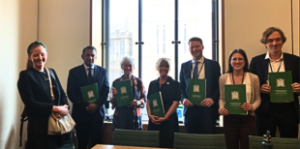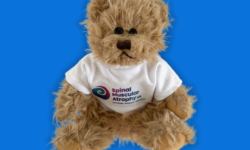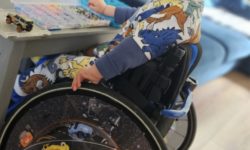On Wednesday 24th May, the All Party Parliamentary Group (APPG) for Muscular Dystrophy met at Westminster to discuss the inquiry report on Newborn Screening for Rare Conditions.

(In the image, from left to right: Alice Fabre – Project Manager, UK SMA Newborn Screening Alliance; Professor Bobby Gasper – Honorary Clinical Professor, Great Ormond Street Hospital; Liz Ryburn – Information & Support Coordinator at SMA UK; Portia Thorman – Advocacy Lead at SMA UK; Rob Burley – Director of Campaigns, Care, and Support at MDUK; Rachel Clayton – Senior Policy and Public Affairs Officer, Genetic Alliance UK; Kacper Rucinski – European Alliance for Newborn Screening for SMA).
Newborn screening is a vital tool for achieving timely diagnosis of rare conditions. For SMA, which now has treatments that give the best outcomes when administered pre-symptomatically, the need for newborn screening has never been so urgent.
Muscular Dystrophy UK (MDUK) led the inquiry which is outlined in this report. They brought together stakeholders from the rare disease community including clinicians, academics, health policy specialists, health economists and advocacy group representatives. Views were shared in a survey, a roundtable discussion, and through in-depth interviews. Findings were summarised in the report as a number of reccomendations for how the processes with the UK National Screening Committee (UK NSC) need to change for rare diseases.
The APPG meeting was attended in-person by representatives from a range of rare disease organisations including Genetic Alliance UK, MDUK and SMA UK, together with a number of cross-parliamentary MPs. During the meeting, the reccomendations in the report were summarised and discussed:
- Assessment of rare conditions by the UK NSC needs to be faster, yet remain reliable. The report identifies ways in which this could be possible.
- Evidence requirements need to be adjusted for rare diseases where evidence is harder to find.
- There needs to be increased engagement and openess with the rare disease community throughout the assessment process.
It is hoped that now we have a report, we will be able to secure a Westminter Hall Debate to discuss the recommendations with a larger group of politicians who could help to influence change in the UK’s approach to newborn screening for rare diseases.
If you would like to help the campaign for newborn screening, then please visit the UK SMA Newborn Screening website here.


